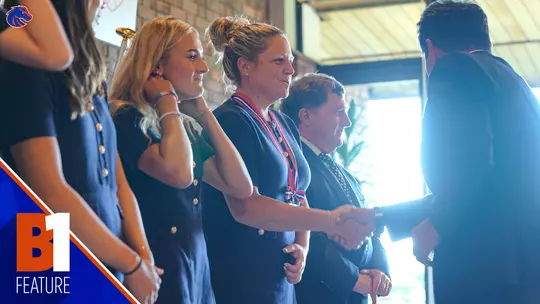
Leading Team USA
David Dietrich
When Kailin Downs was a rising senior for the New Mexico women’s golf team, she received what she considered a once-in-a-lifetime opportunity: the privilege to represent the United States on the international stage. She helped Team USA to a 32-28 victory at the 2004 Fuji Xerox USA vs. Japan Collegiate Golf Championship, played in Ichihara, Japan. That year’s team was led by UCLA head coach Carrie Forsyth, who is a two-time national champion and National Golf Coaches Association Hall of Famer. Forsyth saw potential for Downs to be a coach after witnessing her leadership with that team. “She takes everybody under her wing. She wants to be helpful,” Forsyth explained. “Those are wonderful traits for a leader and a friend.”
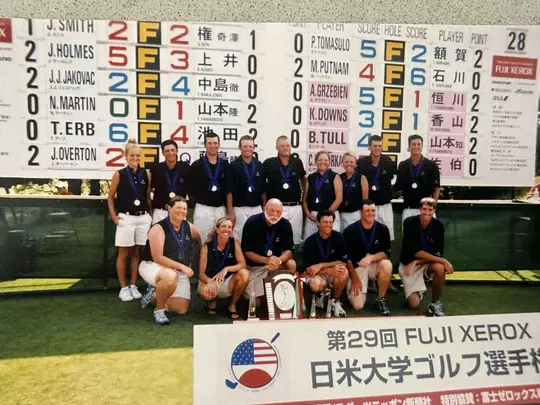
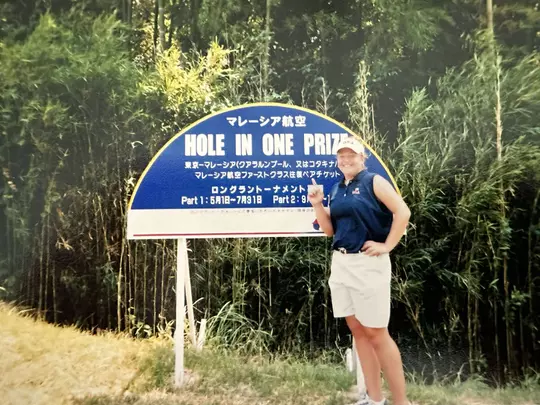
Forsyth’s prediction came true, as Downs followed her All-America playing career by climbing the ranks from Oregon State assistant coach to her current role of Boise State head coach. During her fourth season with the Broncos, Downs received a phone call from J.R. Steinbauer, the tournament director for the International Golf Championship. He offered her another once-in-a-lifetime opportunity, this time coaching Team USA at the 2025 TOYOTA Junior Golf World Cup. Founded in 1992, the tournament features 12 boys’ teams and nine girls’ teams competing for the annual championships at Chukyo Golf Club in Nagoya, Japan.
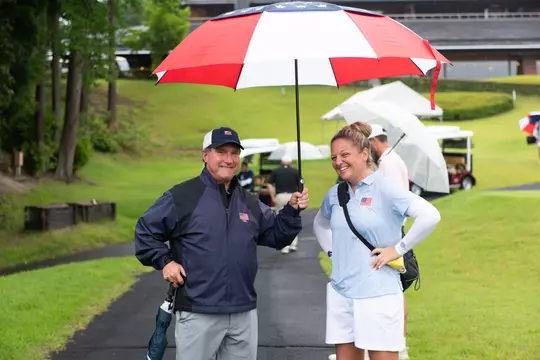
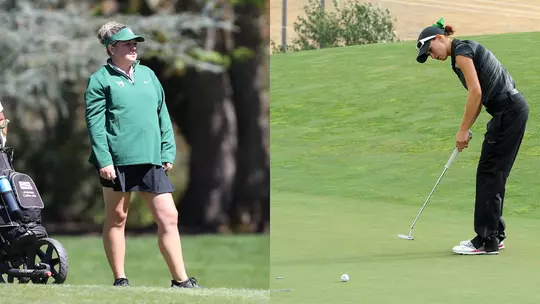
After confirming the timing worked with her schedule, Downs accepted the role and prepared for her second experience representing the country at the international level. She knew she could rely on her playing experience and embrace a full-circle moment. “The fact I had played for the country in Japan myself was cool for me,” she said. “To get a chance to go coach an event like that wasn't the exact same, but very similar in a lot of ways. I knew what I was getting into.” When Downs informed Forsyth, the Hall of Famer’s instant reaction was that “she’ll knock it out of the park.”
Downs’ connections in the golf world were vital in the process, as she was recommended to Steinbauer by Alyssa Waite, the Long Beach State head coach who played for her at Portland State and previously coached Team USA. Yet another connection awaited her in Japan when she joined forces with the Team USA Boys’ coach, Glen Millican. He began his head coaching career at New Mexico the same year Downs started her playing career. “I was excited to coach the American team, but it was extra special knowing I’d reconnect and share the experience with Kailin,” he said. “We both started a big part of our lives and careers at the same place and time.” Leading six of the country’s top junior golfers, the duo was ready for a week in Nagoya.
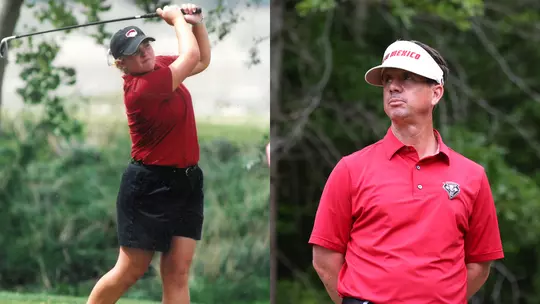
JUNE 19-20: TRAVEL DAY(S)
Downs’ journey began in Oregon, where she boarded a flight to Los Angeles. The boys and girls teams met for dinner that evening, enjoying a moment together before their international journey. Early the next morning, they departed for Japan. Due to the flight duration and time difference, the crew left on the morning of June 19 and arrived in Japan on the evening of June 20. The large scale of the tournament meant teams shared vans from the airport to the hotel, awaiting their golf bags, which were transported on a separate vehicle. By the time things settled, it was nearing midnight, so the teams rested for their exciting week.
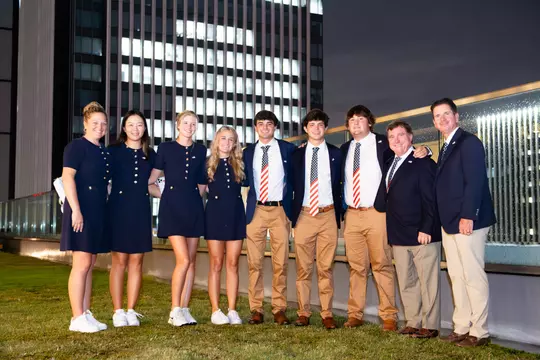
JUNE 21: EXPLORING NAGOYA, FIRST BIRTHDAY
Before the competition, each team had the opportunity to explore Nagoya, including the Toyota Automobile Museum, which displays over 4,000 pieces of automobile-related cultural items. Next was a Japanese-style barbeque lunch, where each patron grilled their own entrees with help from the restaurant staff. Following the meal, the team took a bus to a course to practice. Downs guided a team that featured Gianna Clemente, Nikki Oh and Scarlett Schremmeer. After a few hours on the course, the group went downtown to celebrate Downs’ birthday, discovering the underground part of the city that included shops and restaurants connected by a rail system. “We went to a local place where the entire menu was in Japanese, so we had to use Google Translate on our phones to order,” she explained. “It was quite the experience, but a great birthday.”
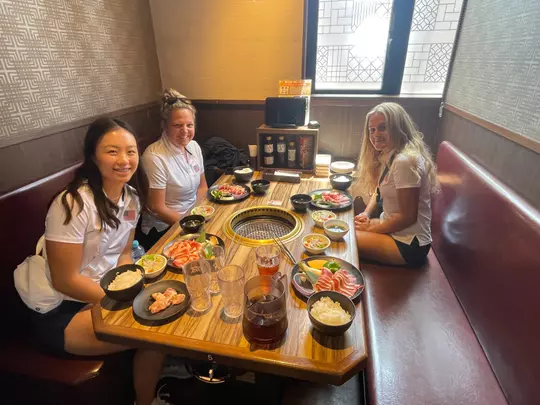
JUNE 22: JUNIOR AM, SECOND BIRTHDAY
Because it was still June 21 in the United States, most of Downs’ friends and family sent their birthday wishes when she was already onto the next day, making her feel like she “had two birthdays in one trip.” The day was centered around the Junior Amateur Tournament, where players, sponsors and other locals played a round on the course. Here, the group got to experience unique Japanese golf traditions. Because of the hilly landscape, teams took escalators to certain holes. They also stopped at the turn to sit down for a meal before playing the back nine, sharing the time with members of their group.
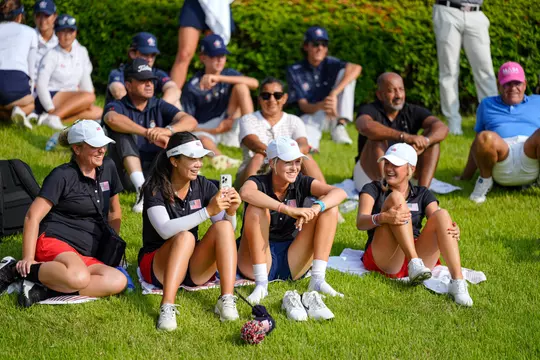
JUNE 23: PRACTICE ROUND, OPENING CEREMONY
Much like college golf, the day before a tournament is reserved for a practice round. Poor weather forced two members of the team to stop after nine holes, but Downs offered one-on-one coaching for Schremmer. The round wrapped up and all tournament participants headed to the opening ceremony. Each team was dressed in an official uniform, then introduced before their country’s national anthem was played. “There were 14 teams, so it was very lengthy, but very cool,” said Downs.
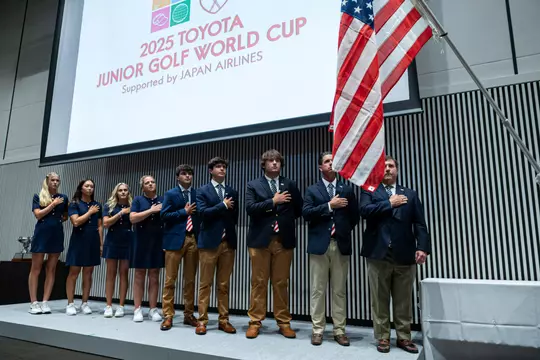
JUNE 24: ROUND ONE
Team USA had the first tee time of the tournament, but the group was used to waking up around 3:30 a.m. thanks to the time difference. While the round was not up to the team’s standard, Downs relied on her coaching experience from the collegiate level. Sitting in seventh after 18 holes, she looked to help the girls manage the mental and emotional side of the game to rebound from the tough start. “It was very consistent with what I do in my day-to-day job. If things aren’t going well, how can I turn it around?” explained Downs.
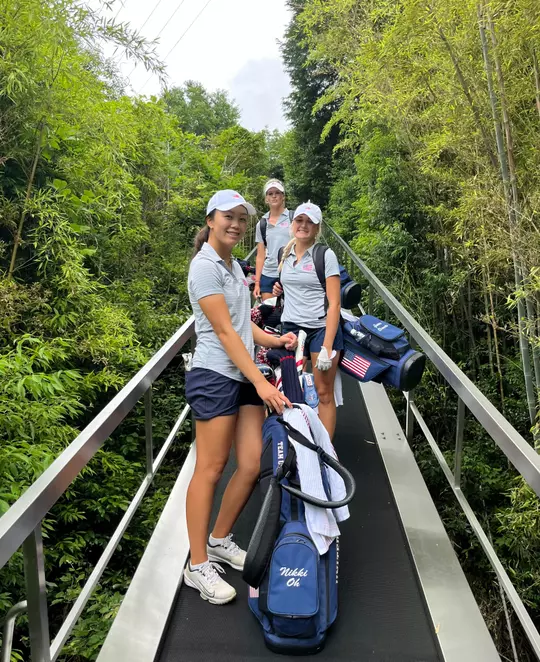
JUNE 25: ROUND TWO
The second round was Team USA’s opportunity to turn it around and they did just that. They improved by six strokes, posting the third-best score of the day at 140 (-4). “We were fired up because we didn’t enjoy how we played in round one,” Downs said. “It was a four-day tournament, so we had time to make it up.” Because only two individual scores counted toward the team total, Downs emphasized taking it one day at a time. “I reminded them you can’t do it all at once. Let’s make up some ground today,” she said. “We were pleased with the improvement.”
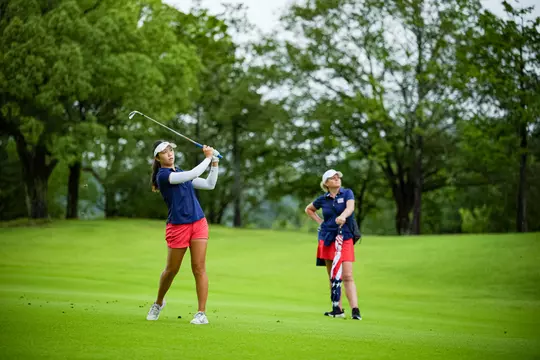
JUNE 26: ROUND THREE
Improvement was once again the message of the third round, which proved extremely difficult because of a long-term weather delay. “We were pulled off the course for almost three hours. We had to take over the whole area where the teams eat,” Downs explained. “Part of it was good, because we got to sit down, eat and recover, but it’s never easy to go back out and finish. It was a long day.” Despite the adversity, the Americans attained their goal, finishing three strokes better than the day before and climbing to fourth place.
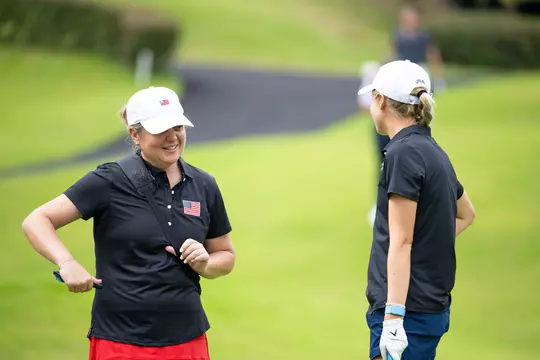
JUNE 27: ROUND FOUR, CLOSING CEREMONY
Entering the final round, Team USA knew it was in reach of its goal of earning a spot on the podium. One of the biggest motivations for landing on the podium was the opportunity to receive a medal while hearing the national anthem, a milestone the boys’ team also wanted to achieve. The girls’ team duplicated its score from the third round, edging Canada by one stroke to earn the bronze medal. The boys’ team maintained its second-place position, giving the American group two chances to receive medals and hear the Star Spangled Banner, moments Downs says she’ll always remember.
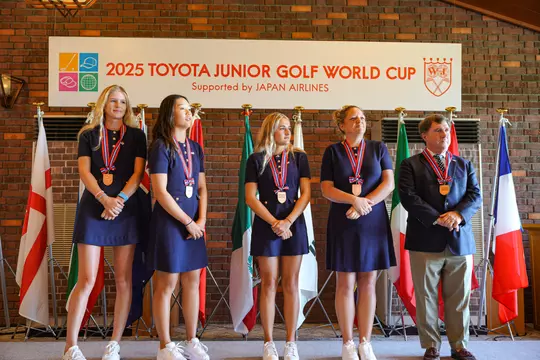
JUNE 28: RETURNING HOME
The return trip mirrored the route from Oregon, with Downs scheduled to land at the same time she departed, thanks to the time difference. Unfortunately, her connecting flight was canceled and she spent over eight hours in the Los Angeles airport. What she thought would be a day that felt like going back in time turned into a night where she felt stuck in time, but she made it home safely that night. Having found routine in waking up at 3:30 a.m., Downs once again awoke at that time, wondering why she could only get a few hours of sleep. After taking a few days to return to a normal work and sleep schedule, she was able to reflect on the journey. Having traveled to Japan three times, Downs fondly remembers her experiences and the people who made each trip special. “They were extremely gracious and very kind to everyone there,” she said. “They rolled out the red carpet and made the experience easy and great for all of us.” The food and the setting were also among her highlights, crediting Japan for having “the best rice ever” and calling Nagoya “one of the most beautiful and clean places I’ve ever been.”
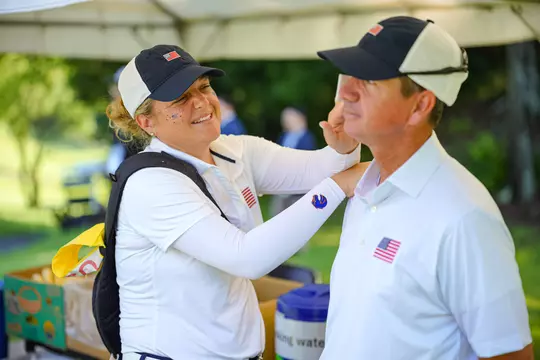
Downs is also grateful for the opportunity to coach “three elite players that I can cheer for and follow along for the rest of their careers.” Above all, she is proud to represent the United States.
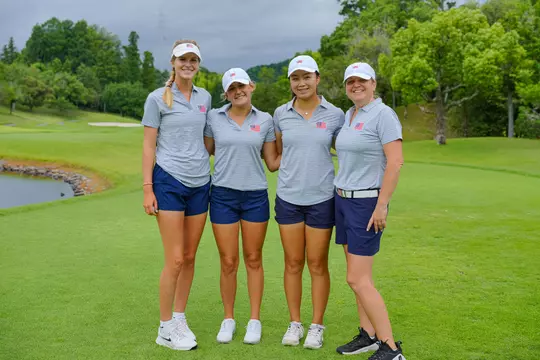
“I’m a proud American, so I was absolutely thrilled to wear our country’s colors and flag.”Kailin Downs, Boise State women's golf head coach and 2025 Team USA TOYOTA Junior Golf Cup girls' coach


















































